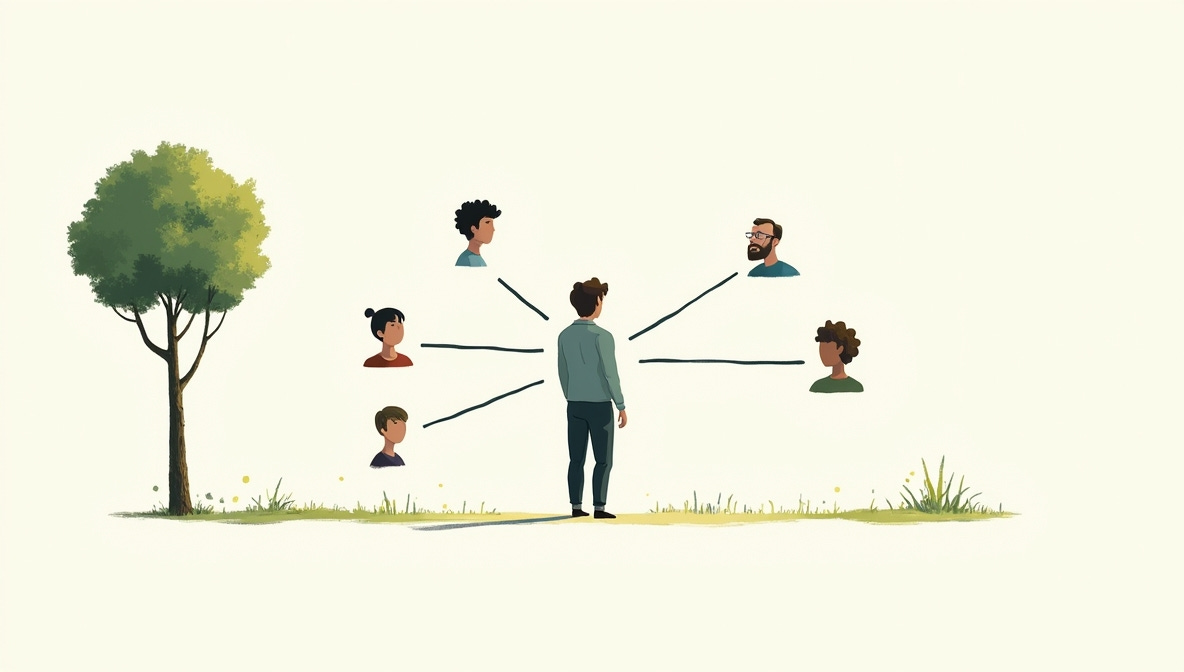Support Networks in the AI Era
Why we need AI assistants that nudge us to call a friend with relevant knowledge rather than immediately providing the answer themselves.
In my previous article, I shared my journey of dealing with insomnia and discovering the value of reactivating my personal support network. Back then, AI tools like ChatGPT offered limited practical advice for my specific sleep challenges.
Two years later, the AI landscape has transformed dramatically. As these systems increasingly provide useful advice, we face a crucial question:
Should we continue relying on human support networks, or are we better off delegating our decisions to algorithms?
The AI Marketing Revolution
The evolution of AI since the first ChatGPT model is nothing short of extraordinary. Today's large language models have revolutionized marketing and content creation:
Content production has become effortless. Companies that once published two blog posts weekly can now generate twenty—creating an overwhelming flood of information for consumers.
Video creation is now simple and accessible. AI can produce convincing videos featuring seemingly satisfied customers—even when these "people" don't actually exist.
Multi-channel distribution happens instantly. AI can personalize content for every demographic, adjusting messages, length, and format without human involvement.
What we're witnessing is the emergence of perfect marketing machines. These AI-powered systems don't just create and distribute content—they make organizations vastly more efficient at studying consumer behavior, testing messages, and identifying what resonates with each target audience.
From a company's perspective, each of us has become a well-defined "persona." They've tested their marketing on people similar to us to ensure their messages trigger precisely the right emotions that drive purchasing decisions. They understand our desire for quick, efficient solutions and consistently deliver this perception.
The Trust Challenge
This new reality creates a fundamental problem: how can we assess the credibility of companies and their offerings when their messaging has been optimized to near perfection?
Our analytical minds struggle in this information-saturated environment. None of us are experts in everything, and with the right narrative, compelling evidence can support contradicting positions. We can't rely solely on intuition because products are now expertly designed to bypass our trustworthiness detectors.
Even more challenging is that many products might work perfectly for most people yet fail to address our specific needs—as I discovered with the numerous sleep solutions I tried during my insomnia journey.
The Human Solution
I believe the answer lies in how people evaluated credibility before the internet era. When facing important decisions, we turned to people we trusted within our personal networks:
We consulted friends with firsthand experience of a product, professional, or service
We listened to their stories and evaluated what was relevant to our situation
We made judgments based on these recommendations combined with our intuition
While we'll continue using the internet, Google, and AI to discover options and educate ourselves, when decision time comes, we should turn to our personal networks rather than spending excessive time analyzing online credibility signals. This becomes especially crucial for high-stakes decisions about health, education, careers, and other life-changing choices.
Two Possible Futures
As AI transforms how we communicate and make decisions, we face two divergent paths:
The Algorithm-Centric World: Isolation
In this future, we rely solely on algorithms and the internet for information and decisions. Our motivation to build meaningful relationships diminishes as we grow increasingly disconnected from one another. We become "self-sufficient" in our isolation, maintaining contact with only a few close people while algorithms shape our choices and lives.
The Relationship-Centric World: Connection
Alternatively, we could use AI to strengthen human connections. AI would serve as an assistant, encouraging us to form and maintain relationships, exchange information, and engage with our networks.
Imagine AI that prompts you to call a friend for advice rather than providing AI-generated answers. In such a world, misinformation would struggle to thrive because we'd rely on both online information and our trusted personal networks.
This shift from "Algorithms know best" to "My Network knows best" acknowledges a crucial truth: unlike AI, humans possess moral compasses rooted in shared values and lived experience. Building this future begins with something as simple as reaching out to a friend for advice.
Moving Forward
I believe the sophistication of AI doesn't diminish human connection—it amplifies its importance. As perfect marketing and tailored content become commonplace, the experiences and wisdom of those we trust will become our essential decision-making tools.
For this vision to beаcome reality, we need the right tools to manage and activate our support networks. We need AI assistants that nudge us to call a friend with relevant knowledge rather than immediately providing the answer themselves.
At Abilitics, we're developing these tools, and I'll share more about them in the coming weeks.
What future do you envision for human-AI interaction? Do you see value in AI that encourages us to contact our friends? Or are there better ways AI can enhance how we make decisions? I'd love to hear your thoughts.








